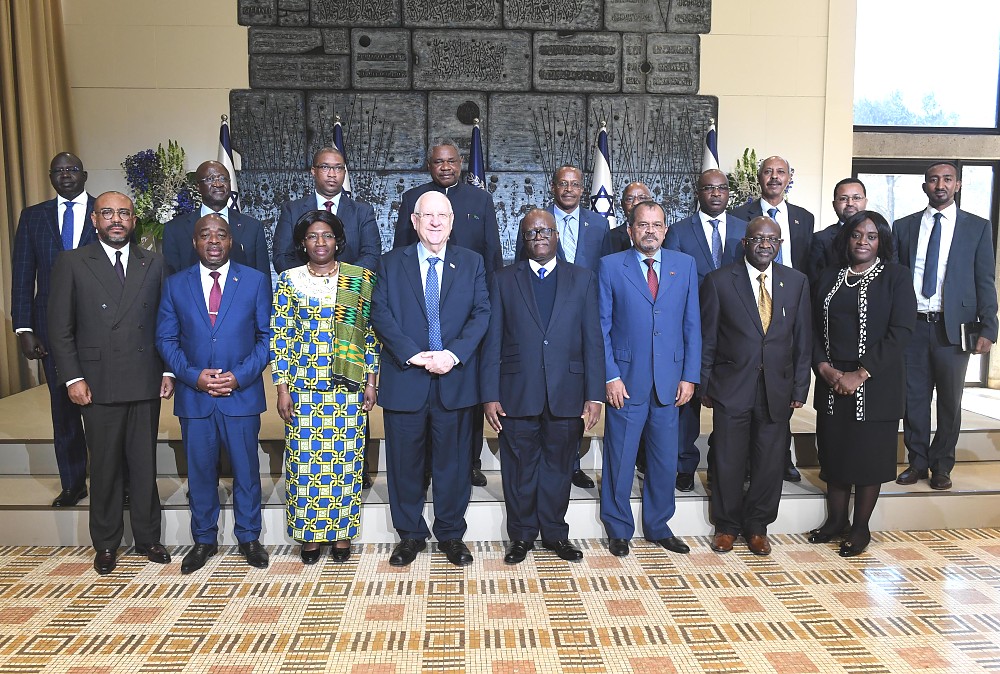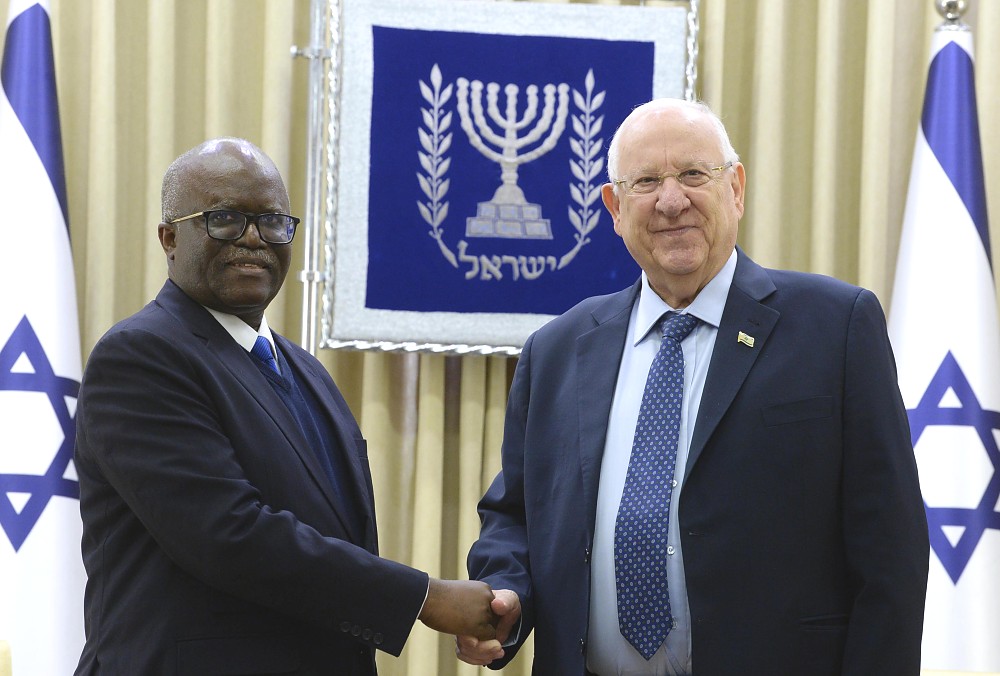President Rivlin on the UN Human Rights Council’s ‘blacklist’ published yesterday:
“When Israeli businesses are under the threat of boycott, we will stand with them. Boycotting Israeli companies does not advance the cause of peace and does not build confidence between the sides. We hope that our friends will oppose this outrageous political decision.”
The President commented on the ‘blacklist’ published yesterday by the UNCHR, saying “I am proud to be Israeli. I am proud that these are Israeli businesses, patriots who contribute to Israeli society, to economy and to peace. When Israeli businesses are under the threat of boycott, we will stand with them. Boycotting Israeli companies does not advance the cause of peace and does not build confidence between the sides. We hope that our friends will oppose this outrageous political decision.”
President Reuven (Ruvi) Rivlin today, Thursday 13 February 2020, met a delegation of Ambassadors from African countries to Israel, headed by the Ambassador of Zambia, Mr. Martin Mwanambale as the Dean of the African Group of Ambassadors to officially launch the South Africa Ministry of Foreign Affairs Forum.
President Rivlin emphasized that Israel is ready to share its knowledge in areas of cyber security, health, technology, agriculture, water management, tourism and more with all African states.
Speaking about the meeting with the Ambassadors, which is part of the new Africa-MFA forum launched to strengthen relations with the continent, the President said, “It is a pleasure to welcome you here. I believe that Africa is the continent of the future and I deeply believe that Israel and Africa are natural partners in turning challenges into opportunities. We have so much in common. We are young states but old nations, we have diverse societies, and we share a commitment to democracy.”
The President noted how happy he was with the relations with African states in a range of areas, saying “In the diplomatic arena, we opened last year a new embassy in Kigali, and we have growing relations with Muslim African countries. In this context we would like to resume our observer status at the African Union. In the security area, we both face the threats of terror and cyber-attacks, and we are happy to share our knowledge in the fields of counter-terror and cyber security. In the economic sphere, we recently opened up two new economic offices in Ghana and Kenya. And in the field of development, we have been cooperating almost from the birth of the State of Israel.”
H.E. Martin Mwanambale, Ambassador of Zambia, as the Dean of the African Group of Ambassadors, thanked the President for the meeting, saying “We are honored to be welcomed here today. This new Forum is very important to us. Our main function is to improve cooperation between Israel and Africa. We are aware of the challenges that Africa faces - health, sanitation, energy, slow growth. We appreciate that Israel has the know-how so we are looking to find opportunities for cooperation. It is a two-way relationship and together we can achieve a lot.” He added: "Coming together is a beginning. Staying together is progress and working together is success."
In general, the African diplomats were primarily interested in acquiring Israeli know-how in cyber security and in fighting terrorism. They also wanted to see more Israeli investment in their countries.
The first African country to establish relations with Israel was Ghana in 1959.
Unlike her colleagues who confined their remarks purely to bilateral relations between their respective countries and Israel, Ghana's Ambassador, Hannah Ama Nyarko, pledged that her country would take up Israel's cause at the African Union also spoke about disturbing reports of rising antisemitism in the world and compared it to the negative attitudes towards Africans and people of color whose ancestors were African. "Racism and hatred go together," responded Rivlin. "We know where it begins but not the end."
Kenya's Ambassador, Samuel Thuita, said that his country would support Israel at the United Nations.
Jean Marie Ngakala, the Charge d'Affaires of the Democratic Republic of Congo, lamented that the last high-ranking Israeli Official to visit his country had been Yitzhak Shamir, whereas numerous officials and businesspeople have visited other African States.
South Sudan's Ambassador, Wol Mayer Ariec, said that his country was very concerned about terrorism in general and looked to Israel for assistance "because Israel knows how to fight terrorism."
Nigerian Ambassador, Enoch Pear Duchi, also valued Israel's help in fighting terrorism.
Luciano Ncogo Ndong Ayecaba, the Ambassador of Equatorial Guinea, said that his country does not have financial resources with which to import goods and would welcome more direct investment.
Angola's Ambassador, Osvaldo dos Santos Varela, made a similar request saying that Angola has natural resources but doesn't have money.
Ethiopia's Ambassador, Reta Alemu Nega, proposed an economic partnership between Israel and African states.
Tanzania's Ambassador, Job Daudi Masima, said that the issue of Israel regaining observer status in the African Union had been dragging on for too long.
Several Ambassadors invited Rivlin to visit their respective countries and some also said that their Presidents were eager to come to Israel.
GPO and Jerusalem Post


